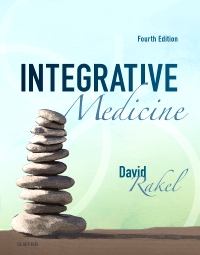
Evolve Resources for Integrative Medicine, 4th Edition
Resources

-
- Helps you safely and effectively incorporate complementary and alternative therapies into your everyday practice, while focusing on prevention and wellness for a better quality of life.
- Uses the reliable SORT method (Strength of Recommendation Taxonomy) to provide evidence-based ratings, grading both the evidence and the relative potential harm.
- Explains how to make the best use of integrative medicine and the mechanisms by which these therapeutic modalities work, keeping you at the forefront of the trend toward integrative health care.
- Expert Consult™ eBook version included with purchase. This enhanced eBook experience allows you to search all of the text, figures, videos, and references from the book on a variety of devices.
-
- Includes 13 brand-new chapters, covering hot topics such as personalized medicine, MTHFR mutation, food allergy and intolerance, the gut-immune influence on systemic inflammation and disease, chelation therapy, testosterone deficiency, adrenal fatigue, and much more.
- Features more than 100 significantly revised chapters and hundreds of new figures and tables throughout.
- Provides online access to new multiple-choice questions for every chapter, perfect for board exam review – plus downloadable Patient Education Guides and video collections.
-
Part I INTEGRATIVE MEDICINE
1. The Philosophy of Integrative Medicine
2. Creating Optimal Healing Environments
3. The Healing Encounter
4. The Whole Health Process
Part II INTEGRATIVE APPROACH TO DISEASE
Section 1. Affective Disorders
5. Depression
6. Anxiety
7. Attention Deficit Disorder
8. Autism Spectrum Disorder
9. Insomnia
10. Posttraumatic Stress Disorder (PTSD)
Section 2. Neurology
11. Alzheimer’s Disease
12. Headache
13. Peripheral Neuropathy
14. Multiple Sclerosis
15. Parkinson’s Disease
Section 3. Infectious Disease
16. Otitis Media
17. Chronic Sinusitis
18. Viral Upper Respiratory Infection
19. HIV/AIDS
20. Herpes Simplex Virus
21. Chronic Hepatitis
22. Urinary Tract Infection (UTI)
23. Lyme Disease
Section 4. Cardiovascular Disease
24. Hypertension
25. Heart Failure
26. Coronary Artery Disease
27. Dyslipidemia
28. Cardiac Arrhythmia
Section 5. Allergy/Intolerance
29. Asthma
30. The Allergic Patient
31. Food Allergy and Intolerance
Section 6. Metabolic/Endocrine Disorders
32. Insulin Resistance and the Metabolic Syndrome
33. Diabetes Mellitus
34. Hypothyroidism
35. Polycystic Ovarian Syndrome
36. Osteoporosis
37. Obesity
38. MTHFR, Homocysteine and Nutrient Needs
39. Adrenal Fatigue
Section 7. Nephrology
40. Chronic Kidney Disease
Section 8. Gastrointestinal Disorders
41. Irritable Bowel Syndrome
42. Gastroesophageal Reflux Disease
43. Peptic Ulcer Disease
44. Cholelithiasis
45. Recurring Abdominal Pain in Pediatrics
46. Constipation
Section 9. Autoimmune Disorders
47. Fibromyalgia
48. Chronic Fatigue Syndrome
49. Rheumatoid Arthritis
50. Inflammatory Bowel Disease
Section 10. Obstetrics/Gynecology
51. Preconception Counseling and Fertility
52. Labor Pain Management
53. Postdates Pregnancy
54. Nausea and Vomiting in Pregnancy
55. Menopause
56. Premenstrual Syndrome
57. Dysmenorrhea
58. Leiomyomata
59. Vaginal Dryness
Section 11. Urology
60. Benign Prostatic Hyperplasia
61. Urolithiasis
62. Chronic Prostatitis
63. Erectile Dysfunction
64. Testosterone Deficiency
Section 12. Musculoskeletal
65. Osteoarthritis
66. Myofascial Pain Syndrome
67. Chronic Low Back Pain
68. Neck Pain
69. Gout
70. Carpal Tunnel Syndrome
71. Epicondylosis
Section 13. Dermatology
72. Atopic Dermatitis
73. Psoriasis
74. Urticaria
75. Aphthous Stomatitis
76. Seborrheic Dermatitis
77. Acne/Rosacea
Section 14. Cancer
78. Breast Cancer
79. Lung Cancer
80. Prostate Cancer
81. Colon Cancer
82. Palliative and End of Life Care
Section 15. Substance Abuse
83. Alcoholism and Substance Abuse
Section 16. Ophthalmology
84. Cataracts
85. Macular Degeneration
Part III TOOLS FOR YOUR PRACTICE
Section 1a. Lifestyle: Nutrition
86. The Elimination Diet
87. The Glycemic Index/Load
88. The Anti-Inflammatory Diet
89. The DASH Diet
90. The FODMaPs Diet
Section 1b Lifestyle:Exercise
91. Writing an Exercise Prescription
92. Breathing Exercises
93. Low Back Pain Exercises
Section 2. Mind-Body
94. Relaxation Techniques
95. Self Hypnosis Techniques
96. Enhancing Heart Rate Variability
97. Guided Imagery
98. Journaling for Health
99. Forgiveness
100. Recommending Meditation
101. Motivational Interviewing Techniques
102. Emotional Awareness for Pain
103. Energy Psychology
Section 3. Biochemical
104. Prescribing Botanicals
105. Prescribing Probiotics
106. Detoxification
107. Chelation Therapy
108. Reducing Toxic Exposure
Section 4. Biomechanical
109. Strain/Counterstrain
110. Acupuncture for Headache
111. Acupuncture for Nausea and Vomiting
112. Prolotherapy
113. Nasal Irrigation
Section 5. Bioenergetics
114. Taking a Spiritual History
115. Therapeutic Homeopathy
116. Biofield Therapies
Section 6.Other
117. Creating a Green Clinic
118. Integrative Medicine for the Underserved
-
This product is available in the following formats:

















 as described in our
as described in our 